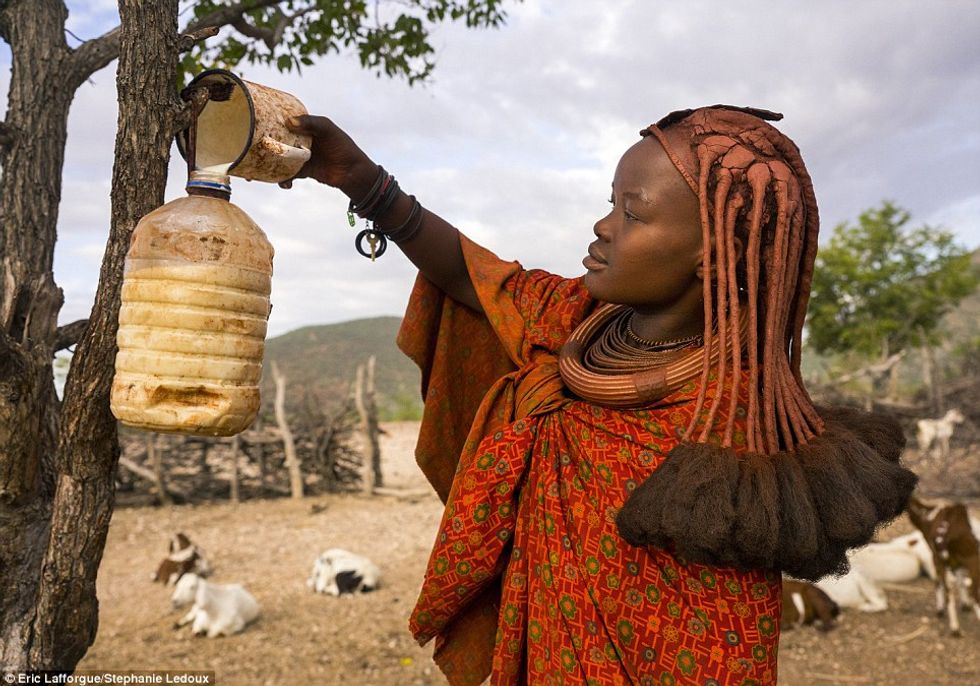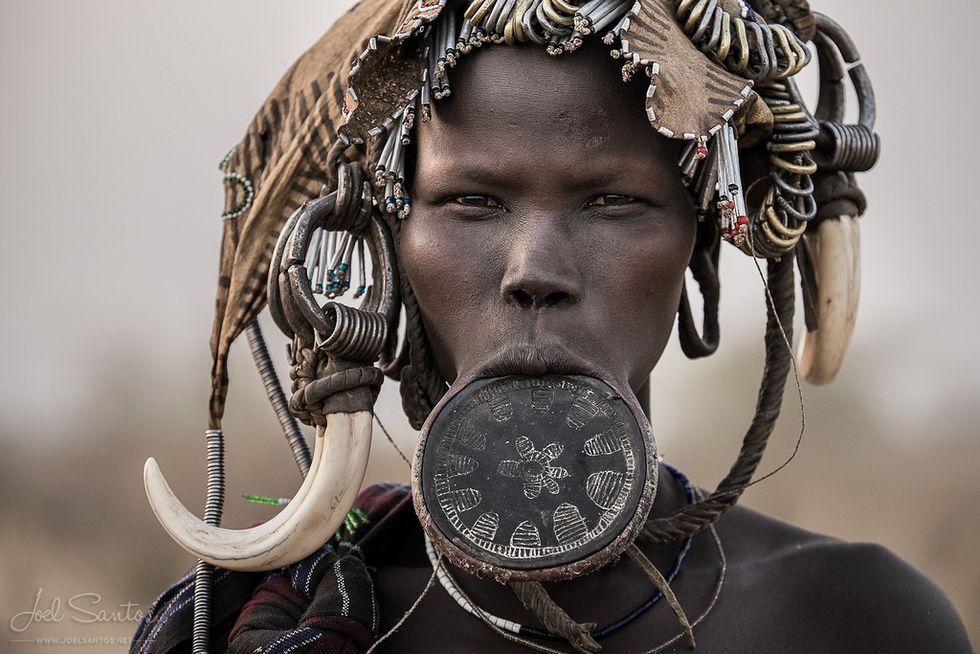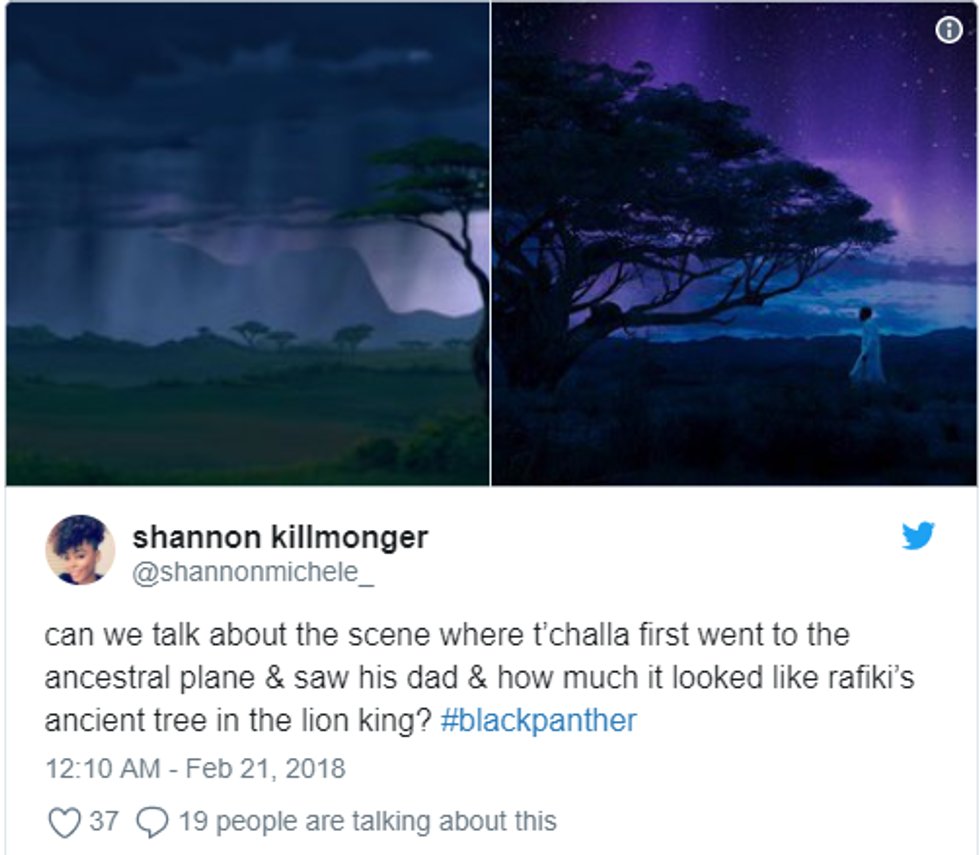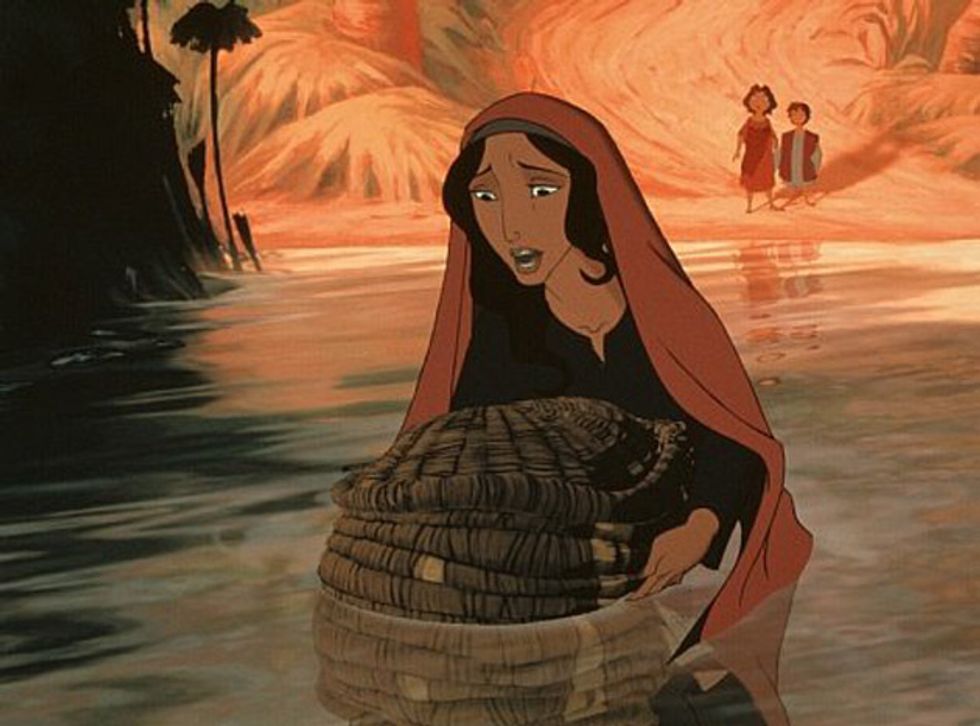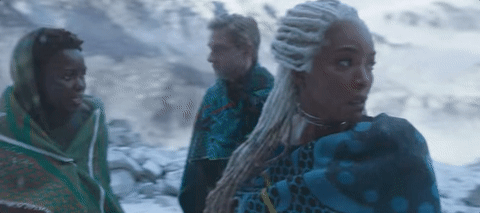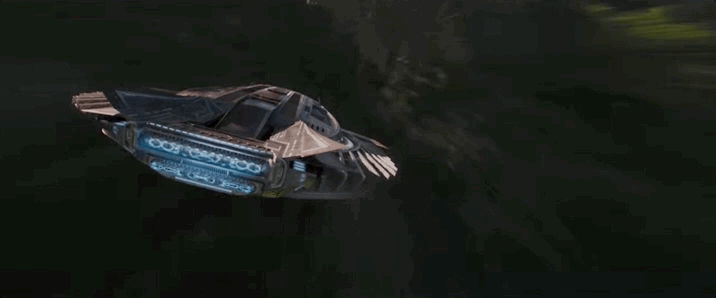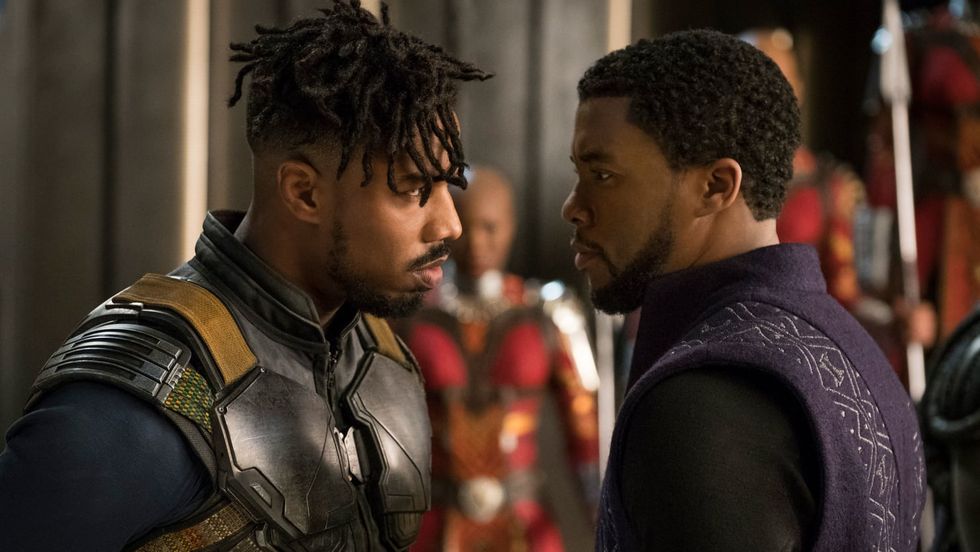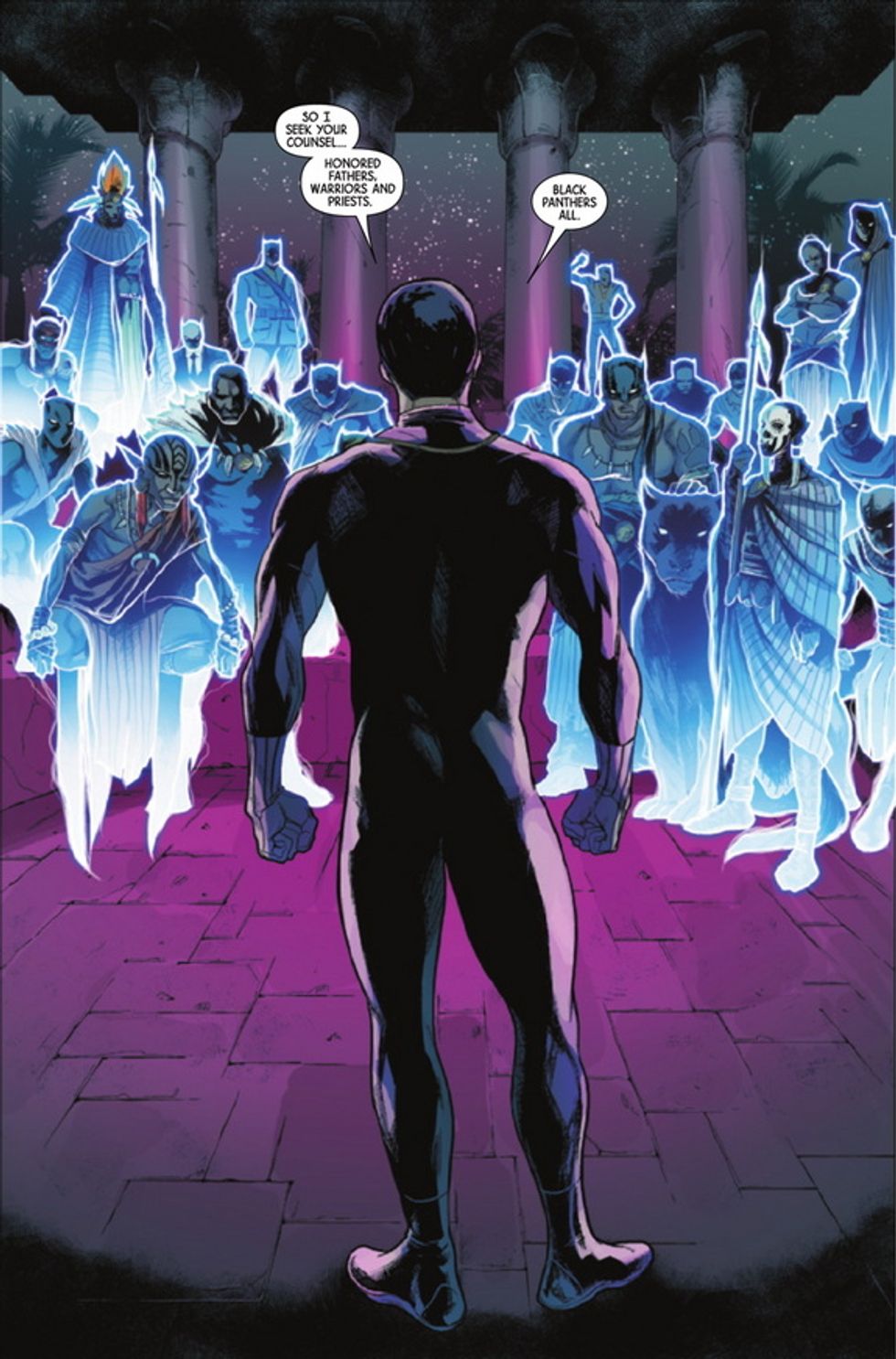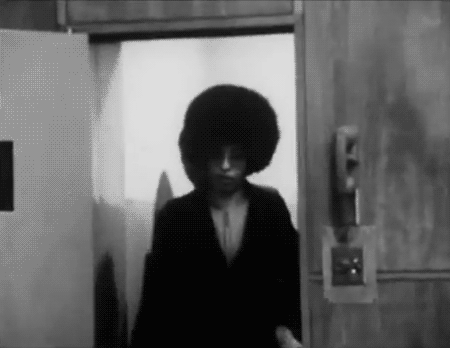I am SO excited to finally be able to write this article because it was honestly such an iconic movie. Shout out to everyone who was a part of this movie, because all of y'all did an AMAZING job and I can't wait to see the cultural impact this movie has on generations to come. You know when there are just certain movies that define certain points in your life? For example, one of my favorite movies, Disney's "Pocahontas," for me, defined my childhood, but also my senior year of high school. I was getting really nostalgic then, so I used to go on childhood, nostalgic binges (no kidding, I used to go to my library and take out "Baby-Sitter's Club" books. I must have looked like an idiot, but I didn't care at all).
The point I'm trying to make is that I want little kids everywhere to think about "Black Panther" as a movie that defines their childhood. I'll explain a little more about the cultural significance a little later. With that being said, here are a few hidden messages in Black Panther, that you might have missed while watching:
1. The traditional African attire & hairstyles
First of all, Ruth E. Carter, who was the costume designer for this movie, did a FANTASTIC job and incorporating a lot of traditional African attires into the kingdom of Wakanda. Also, if y'all know anything about me, it's that hair is very important. In every movie where there are black people, I'm always looking at all the women and their hairstyles.
So, by now, most people understand that African just isn't one big country where everyone has the same ways of living. Different people in different regions and countries in the continent of Africa exhibit different cultures.
In Namibia, there's actually a tribe of women, who apply a paste of butter, fat, and red ochre to their skin and hair, that gives them a reddish-tone. This is called "otjize" and in some cases, it's just for aesthetic reasons, but in others, it can be for protection against the sun and insects.
Traditional lip plates from Ethiopia's Mursi tribe also showed up in Wakanda. Typically, they're worn by women, but some men can wear them too. At the age of 16, a girl's lower lip is cut, and the wooden plug is inserted in as it heals. It's pretty cool if you ask me, and it's obvious that it has influenced many Western looks, such as gauges and plugs.
Of course, there are so many more cultures that were represented in Wakanda, but I love the amazing job they did at incorporating the different countries attires and hairstyles into the costume designs. Everything from the headwear and masks to the patterns on dresses was done so wonderfully. It really shows just how diverse Africa as a continent really is.
2. Parallels Between Black Panther and The Lion King
I should have mentioned that "The Lion King," is yet another movie that represents my childhood. I probably watched that movie over 50 times in my lifetime (that's nothing compared to the 100 times I watched "Pride and Prejudice," but we won't talk about that). So when I saw the scene when T'Challa went into the ancestral world, I immediately thought, "YOU SAID YOU WOULD ALWAYS BE THERE FOR ME."
I just think it's pretty cool because these two are movies that are exclusively (for the most part) set in Africa. And to see the similarities in the cinematography was amazing. ALSO, apparently there's a whole Reddit thread about how similar these two movies are, not just in how they look, but also the storyline.
3. Parallels Between Black Panther and The Bible
I'm probably the only person who picked up on this (and honestly, it's probably not even a real thing, it probably just happened by accident), but I saw a lot of parallels between this movie and the story of Moses.
So a little background, when the Hebrews were slaves in Egypt, the Pharoah declared a law that every first born son that was born a Hebrew would be killed. So when Moses was born, his mother wrapped him in linen and put him in a basket and floated him down the Nile River so his life could be saved. The Pharoah's daughter found baby Moses and his mother ended up being a nurse for the baby. She watched him grow into the leader of Egypt and eventually led the Hebrews out of slavery.
That just reminded me of the scene when T'Challa and Killmonger were fighting for the throne and T'Challa was thrown over the waterfall and into the ocean. This scene definitely symbolizes "rebirth" and T'Challa's soon revival to becoming a better king. So yes, he's thrown over the waterfall and is found by M'Baku and his army. Later, when his family and ex-girlfriend find him there, they nurse him back to health (this is his rebirth and growth) and he soon has the strength, knowledge, and power to become king and lead his people to victory over Killmonger.
4. The Importance of Women & Family
Since we're already talking about how T'Challa's family nursed him back to health, I think it's important to bring up the significant role women have in this movie. From the beginning, we can see that the warriors who defend the king are mostly made up of women. Shuri, T'Challa's genius sister, who brings the Black Panther to life, is a WOMAN. In addition, it was T'Challa's girlfriend, mother, and sister who revive him. At the end of the movie, it is Okoye, who eventually stops the civil war between the nations of Wakanda. Hell, even some of the elders, who are in high positions of power were WOMEN. It just goes to show that in Wakanda, women are respected and deemed as exceptional members of society, just as men are.
They are EXTREMELY progressive. There's a lot of evidence in the movie that proves this but also it's confusing how progressive they are, yet T'Challa was automatically first in line as the king. Why couldn't Shruri battle T'Challa for the throne if she wanted it? And maybe it's because it wouldn't have fit with the storyline (except for that little joke when she raised her hand and complained about her corset), but maybe it was done purposefully. It shows exactly what feminism is — it's not about placing women above men. Maybe Shuri didn't want the crown at all; she seemed perfectly content with being in her lab. It shows that women can put themselves in whatever position they want to — they just need to be respected and treated as equals in society, regardless of said position.
Also, I loved the representation of strong black women in this movie. I want so many little girls to and see this movie and think, "Wow, I want to be smart like Shuri" or "wow, I want to help woman combat *insert social issue here* like Nakia" or "I want to join the military like Okoye." These are things that are so important for little black children to see. Growing up, I didn't have amazing movies like this that showed black people in a really good light. Just like how "Hidden Figures" gave girls the confidence to succeed in STEM, I hope Black Panther inspires them to be great leaders, great mothers/daughters/wives, and great community members.
5. The Portrayal of White People
I thought this was an important subject to bring up too, especially since there were only like two white people in this whole film. So let me break it down:
Klaue: He's the overtly racist white guy. You know, the one that still probably uses the word, "nigger"? LMAO, NO JK (not really though).
One thing he said that stuck out to me: "those savages didn't deserve it anyway." Honestly, this was actually the thought process of many colonizers back in the day. If you didn't know by now, Africa was a pretty well-off continent before the white people came and decided to enslave the western Africans. Just because they didn't have guns and steel, didn't make them any less civilized than the Europeans were. They had intricate trade systems, they knew so much about their land, and they were actually really advanced. So it's interesting to me because these colonizers who came here thought that the Africans couldn't take care of what they had because they were so "savage," so that justified taking what they took.
Yeah, I don't get the reasoning either. But I guess when you have a gun, anything you say can be pretty convincing.
Moving on.
It's also really interesting how they usually called Africans the savages when they're the ones who enslaved the people, broke up cultures, evoked racism, and basically caused black people to be in the predicament they are in today. But no shade though.
Agent Ross: He's the type of white guy who doesn't really know much, not because of racism, but because he hasn't been exposed. He is very open to learning about new things out different cultures and tries not to step over too many boundaries.
Honestly, I felt that Ross' character was unnecessary. The only thing that he did most of the time he was on the screen was stare at the Vibranium. I'm so serious like, the movie would have been fine without him. I didn't like that they put in a white guy to help them battle against Killmonger. Does that mean that the Wakandans weren't powerful enough to face him without external help? Afterall, Ross doesn't care about Wakanda at all, this isn't his home country.
My older sister called me after she saw the to talk about Ross' character and I actually agree with what she had to say. She said that Ross was only in the movie to appeal to the white viewer. Black Panther might have been a little too ethnic and a little too seasoned for some people's taste buds. She feels as though, for ratings and scooping up money in the box office, Marvel had to have ONE "main" character that wasn't black that could also be deemed as a "hero." This is so people can relate to them and get that feel good feeling of "Yeah, we defeated the bad guy," even if they really didn't do much.
6. The Fate of Little Black Boys, Killmonger's Wrath, and His Last Words
Speaking of "the bad guy," did y'all really think Killmonger was the bad guy? HAHAHAHAH, NAHHHH. He wasn't the bad guy at all. He was just a product of the systematic racism that troubles little black boys every day. He wasn't the bad guy, the system is.
Killmonger's wrath, in my opinion, was justified. Maybe the way he went about it was wrong (obviously), but it was definitely justified. Killmonger is just like a lot of other black boys out here. He's seen a lot of deaths, he has witnessed and even experienced police brutality, he grew up without his father, and he was a product of a racist society.
A lot of the times, when these black boys grow up without their fathers, they turn to the streets for a sense of belonging and kinship. They join gangs and often kill their own just for validation from their gang brothers. They grow up around violence and become accustomed to it because it's the reality they live in. Cue a Tupac verse: "I hung around with the thugs, and even though they sold drugs, they showed a young brother love."
Killmonger is no different than any other black boy out here. When you think about it, it's actually really sad that these boys have to grow up in conditions like this. All Killmonger wanted to do was to get the Wakandans to help out their brothers and sisters in America. He believed that it was unfair that they were living in royalty while so many blacks in America were being oppressed. The only thing I see wrong with that is the way he went about it. But I think if anybody had a right to be mad at the world, it was definitely Killmonger.
In one of another really important scenes, Killmonger went back to his ancestral plane (which I'll talk about soon), his father asked him, "no tears for me?" Killmonger replied, "People die every day. That's just part of life around here."
That quote literally shows how black boys who grow up in this rough area are accustomed to violence and death, and it's so sad. They grow up around gang violence coupled with black on black crime and it becomes the only thing that they know. And people wonder why little black boys have so much anger built up inside them? It's because they're literally in a vicious cycle of crime and they can't get out of it. Their whole lives and opportunities were stripped from them the moment they were born, and so they decide to take things into their own hands, the only way they know how.
During one of the really emotional scenes in the movie (yes, even I cried), he said something that was extremely powerful and it's a testament to our ancestors, who we can't even trace back because they were stripped of their identities. When T'Challa said that they have the power to heal Killmonger after he was stabbed during the fight, Killmonger said, "Why, so you can lock me up? No, just bury me in the ocean with my ancestors who jumped from ships, because they knew death was better than bondage."
POWERFUL. SO POWERFUL. I'm thinking about so many Africans who were on the boats on the way to America, who literally committed suicide because they didn't want to be held captive by masters. It's sad, bruh. It's so sad. Like, people took their OWN LIVES because they knew that their futures were going to be so much worse than death could ever be.
7. What Vibranium Represents
So when I watched the movie the first time, I actually didn't pick up on this, but when I went with my boyfriend the second time, he pointed this out to me and it's actually ingenious. While we were talking about all of the symbols in this storyline, he mentioned the importance of Vibranium.
Like sure, it was the thing that literally fueled all of Wakanda, but what does Vibranium REALLY represent? He said Vibranium is literally the potential of Africa. Think about it:
Without colonization and the invasion of the English and Portuguese, what would Africa become? I was talking to one of my friends, Beverly, and she said: "Africa is such a beautiful continent. We would be looked at in a different way if it weren't for imperialism and exploitation. Other countries went to AFRICA for resources." Honestly, the countries in Africa could have been dominant first world countries if it weren't for exploitation from white people.
The Wakandans were afraid to let their secrets known because they know what the world is like. It's full of greed and people will do anything to get their hands on the valuable mineral that literally can do anything. It's no wonder why the Wakandans wanted to be secretive about it.
Again, Beverly told me a real-life example in Africa and so I decided to do a little bit of research on it. 80% of a mineral called Coltan is found in the Congo and it's so important because when refined, it can store an electric charge in a capacitor. Basically, what's used to make our phones and laptops literally come from this mineral in the Congo.
Unfortunately, it's all part of an exploitation process. In an article I read from CNN, it says, "The wealth of this industry doesn't really benefit the Congolese miners for their back-breaking, perilous and poorly paid work." So while countries like AMERICA get these consumer products, there's a literal war going on in the Congo because of Coltan. Women are getting raped, children are literally slave laborers, and people are getting their limbs chopped off for this valuable mineral.
So imagine how successful the Congo could be if all that wealth went back into its economy? It would be a lot like Wakanda, if you ask me.
At the end of the movie the United Nations representative asked T'Challa, "What does a country full of farmers have to offer the world?" and T'Challa's looks at him like, "You have no idea, hahaha." That's exactly how we should be viewing Africa. If it wasn't exploited all the time, it could be a prosperous continent and probably even one of the most lucrative.
8. The Relationship Between Blacks
This particular segment of my article was hard to write, so I needed some help from a few of my friends and their opinions about the disconnect between African Americans and Africans that is portrayed in the movie. At one point in the film, Killmonger says a very important line:
"Not your own? Didn't life start on this continent? So ain't all people your people?"
There clearly is a disconnect between Killmonger and T'Challa in the movie that can be applied to the black diaspora in real life. Here are some of my friends' opinions:
"I definitely feel like black Americans don't want to associate themselves with being African at all. When people ask if an African American is from Africa, they're like, 'I'm not African, I'm Black' as if a color is a race. It's just because of the whole stigma. People suddenly think of poverty and hunger." — Beverly
"There are two very distinct cultures that Africans and African Americans are depicted to have, but Wakanda is the literal promise land. And Killmonger is an African American that feels left out. He wants to better his community and strengthen his culture, but at the expense of pretty much everyone, because his plan would inevitably backfire in the end. It's clear that him knowing the customs and the language was not enough for him to be accepted into Wakanda because he was categorized as an outsider." — Wura
"Africans consider us [African Americans] Americanized and the American media doesn't portray us in a good light either. Therefore, there's no middle and no way for African Americans to trace their ancestry even if they wanted to." — Kory
On both ends of the spectrum, you have each of the two groups thinking that the other one doesn't want to be part of them. Both of the groups believe that the other is foreign to them and that's the case at all. It's all because of imperialism.
People wonder why slavery gets brought up so often in the African American community. We can't just "get over it" if we're still dealing with the problems that have risen out of it on a daily basis. Just think about it: so many African Americans probably don't want to claim Africa because to them, it's not their home country.
When their ancestors were captured and put on ships to the New World, there was a cut in the ties. Families, tribes, and civilizations were torn apart. So when people tell black people, "If you don't like America, then go back to Africa," it's like...
WHERE?
We can't trace back our family trees because we literally DO NOT KNOW where we are from. Africans and African Americans cannot identify with each other sometimes because they literally do not even see each other as one whole unit because of imperialism.
This is even evident when we saw T'Challa go to the ancestral plane versus when we see Killmonger go there.
When T'Challa goes back to the ancestral plane, he can see Wakanda, the beautiful sunset, and most importantly, ALL of his ancestors. Killmonger, however, only goes back to his tiny apartment in Oakland and can see his father. This is so powerful and symbolic to just how badly stripped from our culture we were when our ancestors arrived in the Caribbean, South America and North America.
Killmonger can't even see his ancestors from Wakanda, because all he knows and all he will ever know are his circumstances in Oakland. Like I said, I can't go and trace my family tree to what tribe my ancestors were in in Ghana or Benin or wherever in West Africa my blood originates. I have no idea because their identity was stripped from them when they picked up their slave master's last name. I probably have cousins somewhere in Western Africa, who don't even know I EXIST because our people were torn from each other.
And while this is devastating, we can at least try to fix it. Going to African festivals and wearing Dashikis and eating Jollof isn't enough. I applaud my older sister because she took the time to learn about where our family is possibly from and she has adopted the rich culture into her life. African Americans and Africans have to actually sit down and talk about these disparities between us because we all go through the same thing. We shouldn't be separated from each other just because the colonizers separated us long ago. We need to start seeing each other as brothers and sisters from the same place, rather than what society has made us become.
9. The Subtweet to Trump
When T'Challa was addressing the United Nations Representatives at the end of the movie he said something very relevant in his speech:
"In times of crisis, the wise build bridges, while the foolish build barriers."
Now, some people may say, "Didn't Wakanda build barriers, too?" But the difference between the Wakandans and other people is that Wakanda built barriers to protect themselves and protect Vibranium. I mentioned above what happened to The Democratic Republic of the Congo with the coltan? They didn't want that happening to them. It's not that they necessarily hated anybody.
The real message to take away from this is that at the end, Wakanda finally did open it's doors to the rest of the world because they knew that the resources they have could potentially make the world a better place.
In some ways, first world countries need to think like this too. Instead of shutting everyone out because of differences, we need to actually come together. In America, we can't deprive people of the right to come here and potentially live a happier life. Wasn't our country founded on justice and freedom? So let the people be free and come here to have a shot at the "American dream" they continue to hope for.
10. The Obvious Parallel to the Real Black Panther Party
Initially, I thought the Black Panther comics were inspired by the Black Panther Party, but it really might have been the other way around. Marvel's Black Panther (cr. July 1966) predates the creation of the Black Panther Party (cr. October 1966) by Huey P. Newton and Bobby Seale.
Neither Marvel nor the party says that it was inspired by the other, but the coincidences are still uncanny.
It's interesting how the first major black superhero was a black panther and one of the major parties of the Civil Rights Movements of the 1960's.
A lot of people give the Black Panther Party a bad reputation — they try to erase them from history books, condemning them as radical, criminalistic, and violent. When in reality, the Black Panthers (like every other social movement), just wanted justice for their people. They tried to empower their people and educate the younger generation. They even hosted Free Breakfast For Children Programs, which was amazing because, in a lot of the areas they operated, many children didn't know where their next meal was going to come from.
Though Stan Lee tried to dismiss concerns about the connotations of Black Panther and the Black Panther Party, I feel as though one side of the Civil Rights Movement should not be erased from history books. People should be aware of the things others went through for their freedom and know that it wasn't just one sole person who made efforts to do so. Every social group was in this fight together.
Martin Luther King Jr. was not the only Civil Rights leader of the 60s. Just like how Captain America isn't the only superhero out there. There are so many superheroes out there for children (and adults) to identify with. Just like how there are many great leaders that have flourished in this country, who we can throw our appreciations to.
And to all of those who thought Black Panther was just a "boring Marvel film" or that it was "overhyped." Well... why did it just reach over one billion today?
No, but seriously, if you thought the film was boring or overhyped, then you missed the whole message of the movie. It wasn't a regular Marvel movie about fighting against the forces of evil. This time, the forces were within the black community and they weren't evil — they were justified. The message of this movie is that instead of separating and dividing ourselves because of what we're accustomed to in our history, we should come together and become one great people. It's hard with all the ignorance in the world, but if we learn a little more about each other and share our experiences without criticizing or judging, we'll be better as peers and citizens.


